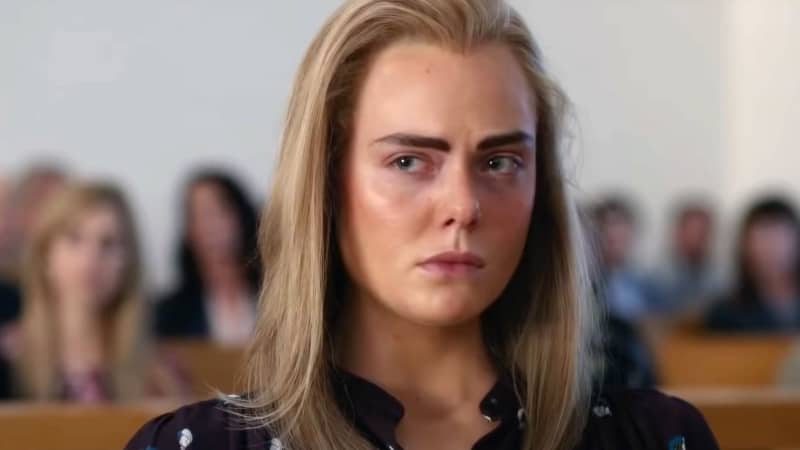
In Hulu’s new series The Girl From Plainville, seventeen-year-old Michelle Carter (Elle Fanning) fixates on stories about love and death. She watches The Fault in Our Stars, and puts the most heartbreaking episode of Glee on repeat like a comfort watch. These are stories that, if not exactly aiming to make sense of death, at least attempt to say something meaningful about it. They boil it down to a metaphor or sing it out with a song.
The Girl From Plainville succeeds by doing the opposite: when Carter eventually goes on to push her heavily depressed boyfriend into committing suicide, the series lets itself live in the uneasiness of a death that’s all questions, no answers. Most importantly, this sensitively told drama never sacrifices one iota of its real-life subjects’ complexity.
Liz Hannah‘s (The Dropout) and Patrick Macmanus’ (Dr. Death) series is based on a real instance; Conrad Roy committed suicide in 2014, and the girl he had been texting on and off for years, Carter, was eventually convicted of involuntary manslaughter after she was revealed to have encouraged his suicide via texts and a fateful phone call. Headlines about the case were stomach-churning, but Erin Lee Carr’s detailed documentary, I Love You, Now Die, painted a more nuanced–if still disturbing–portrait of the event. The Girl From Plainville continues down the route Carr carved out, telling the story with a tremendous amount of empathy for all involved.
Fanning is excellent as Michelle, who the series portrays as a bundle of complexities. She works hard to make and keep friends, but her dips into insecurity and neediness seem to turn people off. She’s typically a positive and giving person, but she also suffers from eating disorders, a strange knack for twisting the truth, and a deep, painful sort of sadness. Her most damaging habit, though, seems to be romanticizing the unromantic. When she begins texting Conrad (Colton Ryan, so good it’s scary), he’s already drowning in thoughts of suicide, but she attempts to steer him towards her instead.
The series elevates itself beyond a simple restating of facts through its pitch-perfect understanding of technology, fantasy, and the role both play in modern teen life. When Conrad dies, people in his life are hesitant to call Michelle his girlfriend, since the pair’s relationship took place largely over text. The show could have easily used the “secret online life” aspect of this story as a scare tactic, but it instead recognizes the very real connection technology provides these two lonely people.
When Michelle gets lost in a text conversation with Conrad, he appears next to her, actively listening as she pours out her pain. The intensity of the couple’s relationship is conveyed through these well-executed scenes, which use as few filmmaking tricks as possible to maintain their realism. Occasionally, we see more fantastic variations of the truth, as when Michelle dreams up fantasy scenes that feel like moments from Glee.
These scenes are perhaps the series’ best case for its own existence. Plenty of recent series have proven that anyone with a production crew can re-enact a crime or a tragedy, but a competent true-crime series isn’t the same as an ethical one. The Girl From Plainville doesn’t just treat its central relationship with compassion and realism, either; it treats every relationship that way. In real life, both Roy and Carter had sought mental health care before they met, and the two continue to get some type of treatment–and deal with the quiet fallout within their families–throughout their relationship.
Conrad’s suicidal ideation, in particular, is handled with such truthfulness that it makes most other depictions of the illness feel utterly unrealistic in comparison. There’s absolutely nothing romantic about the way he feels. His parents, played by Norbert Leo Butz and an on-her-game Chloë Sevigny, do their best to keep him okay and alive. After they find out about his suicide attempt, they don’t talk much about it, but celebrate his victories a little more pointedly, and treat him more gingerly even as they push him towards the adult rites of passage that trigger his anxiety. They come across just like typical real parents, like people who could live down the street. That makes their inability to reach him when he’s standing right next to them all the more heartbreaking.
Over the course of its eight episodes, The Girl From Plainville weaves together two timelines, with one plot set during the aftermath of Roy’s death and the other detailing everything that came before. By the series’ end, there’s no sense to be made of its tragedy, but that in no way makes the show feel pointless. On the contrary, The Girl From Plainville stands out as one of the most nuanced and deliberately un-sensational looks at the “secret lives” of teens I’ve ever seen, and that makes it vital. Its central relationship may be disturbing, yet it’s crystal clear in its profound depiction of the mental illness that isolates so many young adults, and the technology they inevitably reach for when it does.
Related Topics: Hulu, The Girl From Plainville

